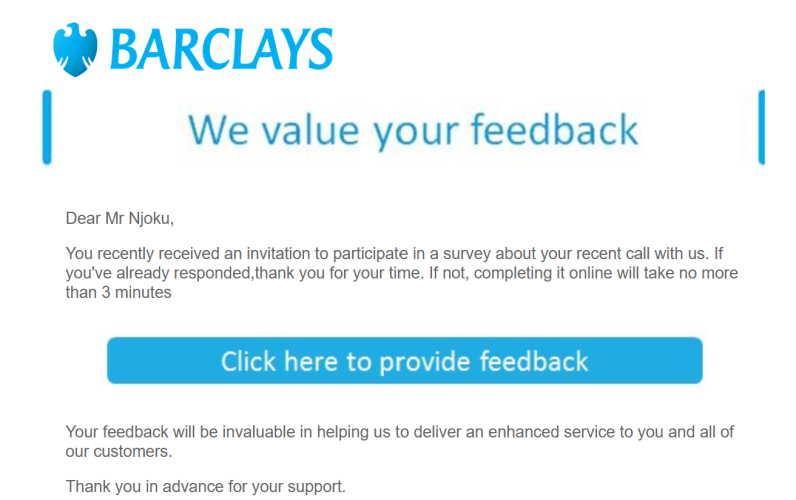Recently, I received an email from Barclays requesting feedback on my recent interaction with their services. Apparently, my experience was less than satisfactory; one that prompted me to visit the branch again to resolve. I was so tempted to provide a very negative feedback for this very reason. However, I must admit that my issue not being resolved did not reflect poorly on the professionalism and politeness of the team, but drawing from this experience, I learned a crucial lesson for marketers and business decision-makers on procedures in collecting customer feedback.
- Timing is Everything
There is an importance for appropriacy in timing when requesting feedback. If your goal is to gather accurate data for future marketing decisions, it is important that the customer’s issue has been completely resolved before soliciting their opinion. Asking for feedback prematurely can result in skewed data that reflects the customer’s frustration rather than their true sentiment about the customer service or the service itself. - Prioritise Resolving any Issues
Even if customer interactions are polite and professional, unresolved issues can lead to lingering dissatisfaction. If a customer’s problem remains unsolved, their frustration will likely be the dominant factor in their feedback. This not only provides inaccurate data but can also tarnish the perceived quality of your services especially if your feedback platform is public, such as Trustpilot or Yelp for example. - A More Empathetic Approach to Feedback
Rather than immediately requesting feedback, a more empathetic approach would be to first ask, “Was your issue resolved? Yes or No.” This simple question shifts the focus to the customer’s needs and ensures that their concerns have been addressed before seeking their opinion on the overall experience. After confirming that the issue has been resolved, businesses can then follow up with a more comprehensive feedback request, ensuring that the data collected is reflective of the customer’s true experience.
The moral of this story is that, just as much effort is put into targeting the right demographic in marketing, the same diligence should be applied when collecting data to inform future marketing strategies. If you ensure that customers’ issues are fully resolved before asking for feedback, perhaps it may lead to more accurate and useful data.
P.S. This isn’t just about Barclays! This is a lesson for all businesses that rely on customer feedback to drive their marketing strategies. It’s possible to create a win-win situation for both businesses and customers.


